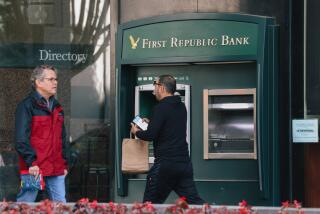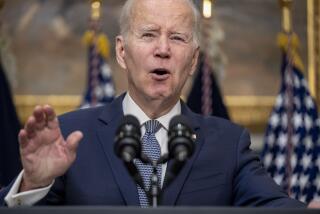Bear Stearns rescue was necessary, Fed chief says
- Share via
WASHINGTON — Federal Reserve Chairman Ben S. Bernanke and the Bush administration on Thursday defended the decision to rescue Bear Stearns Cos. amid questions by lawmakers about why the government was helping Wall Street investment houses but not people on Main Street.
Bernanke and Robert K. Steel, who is the Treasury Department’s undersecretary for domestic finance, said that the consequences to the U.S. economy and financial system would have been far more serious had the government allowed the nation’s fifth-largest investment house to go bankrupt.
“Given the exceptional pressures on the global economy and financial system, the damage caused by a default by Bear Stearns could have been severe and extremely difficult to contain,” Bernanke told the Senate Banking Committee.
The panel conducted a five-hour hearing as lawmakers sought to understand the decisions made in the days after Bear Stearns informed the Fed last month that it was on the verge of having to file for bankruptcy protection because nervous creditors were demanding to be repaid.
The investment house was purchased by JPMorgan Chase & Co. with assistance from the Fed in the form of a loan backed by $30 billion of Bear Stearns assets. JPMorgan has agreed to absorb the first $1 billion of losses if the value of the assets declines, but taxpayers are on the hook for the remaining $29 billion.
Democrats on the Senate Banking Committee questioned why the Fed was willing to put such a large amount of money at risk to protect Wall Street while as many as 3 million homeowners were facing the risk of defaulting on their mortgages with the administration balking at greater efforts to help them.
“Was this a justified rescue to prevent a systemic collapse of financial markets or a $30- billion taxpayer bailout for a Wall Street firm while people on Main Street struggle to pay their mortgages?” asked Christopher J. Dodd (D-Conn.), chairman of the Senate Banking Committee.
Bernanke said that the government’s effort was not a bailout for Bear Stearns shareholders, who will suffer big losses, but an effort to protect the financial system and ultimately the entire U.S. economy.
Most of the panel’s questions on the deal focused on the value of the assets that the Fed is now holding as collateral for the loan.
Bernanke and Timothy F. Geithner, president of the Fed’s New York regional bank, said they believed $30 billion was a valid price for those assets. The central bank could end up making money on the loan, Bernanke said.
But some lawmakers questioned whether the Fed had done enough to properly value the Bear Stearns assets and wondered whether the entire episode had set a dangerous precedent for future risky behavior by other investment houses.
“How big do you have to be to be too big to fail?” asked Sen. Jim Bunning (R-Ky.). “Who let our entire financial system become so fragile that one failure jeopardizes the health of the entire system?”
More to Read
Inside the business of entertainment
The Wide Shot brings you news, analysis and insights on everything from streaming wars to production — and what it all means for the future.
You may occasionally receive promotional content from the Los Angeles Times.









